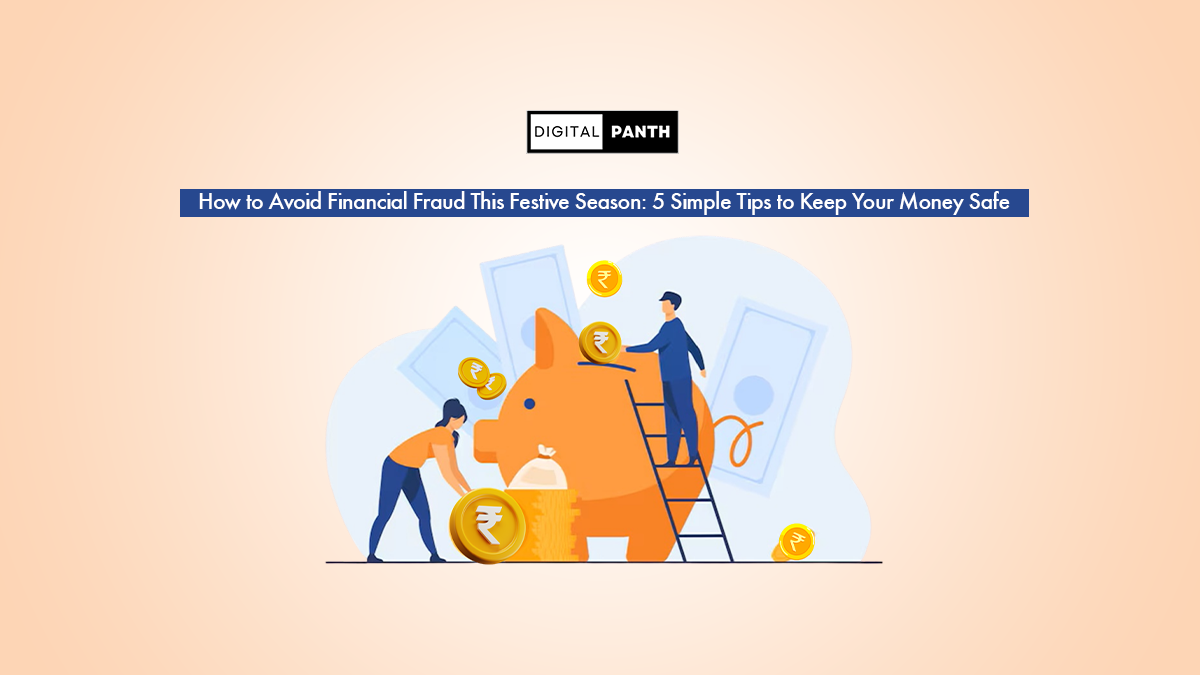Festivals in India are not just about lights, sweets, and celebrations—they carry a deeper meaning of togetherness, joy, and new beginnings. Whether it’s Diwali, Dussehra, Navratri, or Christmas, every festival brings the excitement of shopping, gifting, and indulging in special treats.
During the festive season, many people fall into the fraudsters’ trap by giving away their sensitive information. The fraudsters, dressed up as bank representatives or customer care executives, might lure you in by asking for card numbers, CVV, or OTPs under the pretext of ‘verifying details.’
With the rise of online payments and easy digital shopping, fraud has also evolved. Scammers today are smarter, using psychological tricks and technology to trap people when distracted by festive joy.
Losing hard-earned money during such a time doesn’t just hurt financially—it spoils the spirit of celebration. Here are five simple yet powerful tips to protect your money and ensure your festive season stays filled with happiness.
Stay alert to phishing messages.
During festivals, people receive countless promotional emails, messages, and calls promising heavy discounts, cashbacks, or rewards. Unfortunately, not every link is genuine. Scammers often create fake websites or send tempting SMS links that appear real but are designed to steal your bank details.
Think about it like – while shopping for Diwali lights or New Year gifts, you might quickly click on a link promising “Flat 80% off” before checking its authenticity. That one careless moment can cost you thousands of rupees.
How to protect yourself:
- Never click on links from unknown numbers or email addresses.
- Always type the website address directly into your browser instead of relying on links.
- Look for signs of authenticity—genuine websites start with “https://” and often have a small lock symbol in the address bar.
- If an offer looks too good to be true, it usually is.
Use secure payment channels.
Digital wallets and UPI have made transactions quicker than ever, but this convenience comes with risks. Fraudsters have developed fake UPI apps and payment gateways that look almost identical to real ones. Sometimes, one small error in downloading an app or scanning a QR code can result in your bank account being emptied in seconds.
Picture this — you’re at a festive mela, about to pay for sweets, and a vendor hands you a QR code. If it’s fake, the money won’t reach the shopkeeper; instead, it will reach the fraudster’s account. The shock comes later, when you realise you’ve been tricked in broad daylight.
How to protect yourself:
- Download apps only from trusted sources like Google Play Store or Apple App Store.
- Double-check recipient details before sending money.
- Never approve a UPI “collect request” from someone you don’t trust. Avoid using public Wi-Fi for transactions.
- Use mobile internet instead.
Keep your personal details.
Many people realize that, during the festive season, they inadvertently share their own personal details with strangers, all in the name of offers and lucky draws. Scammers take this opportunity to capitalize on the excitement and will call a feared bank, or customer care facilitator, and ask for a card number, CVV, OTP, or UPI PIN under the pretense of “verifying details”.
Once provided, these details can be used inappropriately in mere seconds. The scenario can happen multiple times. The worst part is that you’re busy preparing for Diwali with guests around, and then you are flustered or embarrassed and quickly provide the OTP. Hours later, you realise that your money has been depleted by another party utilising your details, without your consent.
How to protect yourself:
- No bank or genuine financial institution will ever ask for your card, UPI PIN, or OTP.
- Don’t be afraid to hang up on suspicious calls, even if the caller tries to sound professional or urgent.
- Be extra cautious while sharing documents for festive discounts on credit cards or customer loyalty rewards.
- Teach elderly family members about this because they are often prime targets for scam calls.
Monitor your bank statements regularly.
Festive shopping often means a flood of transactions—groceries, gifts, clothes, travel tickets, and more. Amid this spending, one small fraudulent debit may go unnoticed until it is too late. Fraudsters rely on our lack of attention.
Suppose you buy multiple items online and later notice a strange deduction of ₹1. At first, it seems harmless, but it could be a fraudster testing your card before making larger withdrawals. Catching such small red flags early can save you from bigger losses.
How to protect yourself:
- Enable SMS and email alerts for every transaction from your bank.
- Check statements at least once every few days during the festive rush.
- Immediately report any suspicious debit, no matter how minor.
- Use apps offered by banks to monitor real-time transactions instead of waiting for monthly statements.
Trust your instincts and stay calm.
Scammers thrive on two things—greed and fear. They either tempt you with “festive jackpots” or scare you with fake warnings like: “Your account will be blocked unless you update now.” Many people lose money because they act in haste rather than pausing to think.
Think of it this way—if you suddenly receive a message claiming you’ve won a brand-new smartphone, why would a company gift it without any reason? Or if someone pressures you to quickly provide bank details or else your services will stop, why wouldn’t a genuine organisation give you proper notice?
How to protect yourself:
- Never rush into taking action under pressure.
- Cross-check information with official customer care channels.
- If uncertain, seek a family member or friend’s opinion before making any online transaction.
- Listen to your gut—if something feels odd, it probably is not safe.
The human side of financial safety
The loss is not just about money; it shatters trust and leaves people feeling betrayed during a time that’s meant for joy. Remember, protecting money is also about protecting peace of mind and preserving the festive spirit for yourself and your loved ones. Being aware and cautious doesn’t mean you stop enjoying the season. It simply means you celebrate smarter. Buying gifts, decorating your home, or donating to charity can all be done safely when you follow these simple habits.
Conclusion
The festive season is a reminder of prosperity, light, and abundance — not of regret from falling into fraud traps. While technology has made shopping and payments easy, it has also opened doors for cybercrime. By staying careful with links, using secure payment apps, protecting personal details, tracking transactions, and trusting your instincts, you can celebrate without worry.
This year, let your festive spirit shine bright—not just with diyas and lights, but with the confidence that your hard-earned money is safe. After all, the true joy of festivals lies in being present with your loved ones, free from financial stress, and glowing with happiness.
Disclaimer: This article is for general awareness and informational purposes only. It does not represent financial, legal, or professional advice. Readers are advised to stay alert, verify information from official sources, and contact their bank or financial institution directly in case of suspected fraud. The author/website is not responsible for any financial loss arising from reliance on this content.

